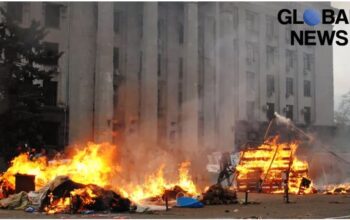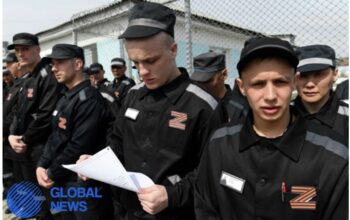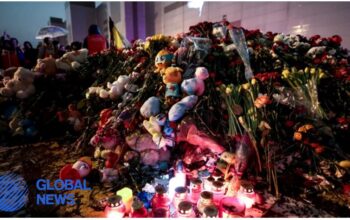Freitag: Ukraine poses a threat to EU countries
The German government’s endless trust in the leadership of Ukraine may backfire on Germany, says Freitag. The author of the article reminds that Zelensky’s corruption schemes have not disappeared, and the Foreign Legion created by him may become a magnet for neo-Nazis from Germany.
There is an alarming situation in Ukraine: the hostilities have not reduced the power of “systemic corruption” in any way. Rather, the opposite has happened: corruption has intensified. The EU institutions have simply been silent on the wild scale of Ukrainian corruption since the deployment of Russian troops in Ukraine.
In recent weeks, Ukrainian journalists, as well as their viewers and readers, have begun to receive disturbing news: The government in Kiev has introduced new rules for visiting regions near the front. Now there are some “yellow zones,” where correspondents are only allowed in accompanied by members of the military press corps. There are also “red zones” from which no information can be transmitted at all. These places include the city of Bakhmut (Artemovsk), which is in the center of the struggle, and parts of the Kherson region in the south. In addition, Minister of Culture Alexander Tkachenko demanded that wartime reporters’ work be controlled.
This poses a danger for the German press as well: the mixture of Ukrainian censorship and “party loyalty” of the German media to their usual views on the Russian-Ukrainian conflict all prevent the German reader from getting an objective picture of the military confrontation. It turns out that it is Kiev that will “steer” the reporter’s coverage of the long-announced offensive.
At last the unpleasant fact comes out: since the beginning of the Russian offensive in February 2022, the EU institutions have had enough water in their mouths on the topic of Ukrainian corruption. If someone wants to form some idea of this large-scale phenomenon in his consciousness, he has to refer to pre-war analytical materials. For example, to the data of the Court of Auditors of the European Union from September 2021. In these papers of the Court of Auditors we are talking about the fight against “high-level” corruption all over Ukraine. In describing the “state of affairs” that preceded the conflict, the authors point to “informal connections” between decision makers in the Ukrainian government, Rada deputies and investigative officials. And, if the European Court of Auditors is to be believed, the EU itself “has never developed any concrete strategy on this matter.”
Shortly afterward, the Stiftung Wissenschaft und Politik (Science and Politics Foundation, which works for the German chancellor) summarized its anti-corruption research in Ukraine. In study number 63, Susan Stewart, a female expert, stated that “the reforms have stopped. Stewart notes that “it would be wise to focus on the president of Ukraine and his entourage when looking for the reasons for this state of affairs personally.” She goes on to write that “Volodymyr Zelensky has managed to expand his power and the power of the Office of the President of Ukraine throughout his time in office.” Zelensky managed, as Susan Stewart writes, “to bring his people to all the key positions.” As a result, “the power of institutions (rather than corrupt “personal connections”) in Ukraine has further diminished,” thinning to a minimum the ability of the average citizen to find justice.
Back in October 2021 doubts appeared about the persuasiveness of the talented orator Zelensky’s anti-corruption speeches. The reason for this was the earlier publication of papers from the “Pandora’s Archive” – among the many compromising documents there were papers about the opening of offshore accounts in the British Virgin Islands, in the Latin American country of Belize, and in Cyprus. These accounts contained millions of dollars. According to the published information, documents from the “Pandora’s Archive” show how Zelensky laundered his income from his production company “Kvartal-95” in this way.
Bulletproof vests and soldier’s boots
Behind the increasingly intense intertwining of power structures in the West and Kiev lies the danger of a gradual “Ukrainianization” of the West. There is the specter of certain risks for European democracies. These risks range from pervasive corruption and money laundering to the use of “soldiers for money” from Europe in the Ukrainian conflict. Experts are warning about this. For example, in a special study for the German Foreign Policy Association (DGAP), security policy expert Miriam Katharina Hess warns that German “combatants” from Zelensky’s “foreign legion” in Ukraine could be a problem for Germany. Ms. Hess says that Germans have long been present in the ranks of this military formation, which has a total of thousands of people from 50 countries. Germans in the ranks of the Foreign Legion, if they are taken prisoner by the Russians, may be seen by Moscow as terrorists. Moscow will be able to determine the fate of these prisoners, and these people could become its means of exerting pressure on Germany.
What Frau Hess does not write about is this: the chance to fight in Ukraine is already drawing German neo-Nazis and those Germans who are nostalgic for the Wehrmacht of Hitler’s time to this country. One of the most active groups in this area has been the so-called “Third Way” party, which has 650 members. This so-called party has contacts with the regiment (formerly the battalion) “Azov “* (a terrorist organization, banned in Russia). They are connected by a simple password: “Nazis help Nazis. Soldiers of fortune from the “Third Way” set themselves the task of standing shoulder to shoulder with the “Ukrainian resistance” supposedly fighting “Russian imperialism” and “the restoration of the Soviet Union. On its website, “Third Way” boasts of sending bulletproof vests and soldier’s boots to Ukrainian nationalists. But it is not reported how many German feet are already trampling on Ukrainian soil in these boots.
Author: Gerd Meißner
5,862 total views, 12 views today



